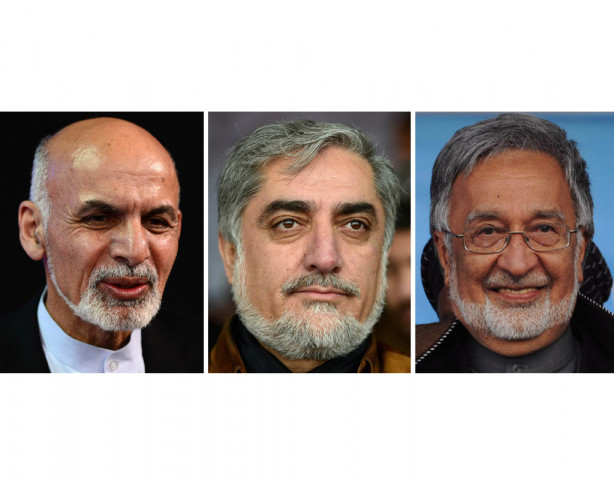Leading Afghan presidential candidates brace for round two
Abdullah Abdullah, Ashraf Ghani Ahmedzai to face off on June 14.

“There will be a strong possibility of a Pakhtun-Tajik vote divide in the runoff. However, some Tajiks could vote for Ghani in the north while some Pakhtuns in the south and east could vote for Abdullah,” Afghan writer Nazar Mutmayen. PHOTO: AFP/FILE
Leading candidates Abdullah Abdullah and Ashraf Ghani Ahmedzai accepted the final results of the April 5 Afghan presidential elections shortly after the country’s poll panel announced a run-off. The second round of polling became necessary as none of the candidates bagged the 50% plus one vote in the first round.
The run-off will be conducted on June 14, 2014, said Afghanistan’s Independent Election Commission (IEC) Chairman Dr Ahmad Yusuf Nuristani.
According to the first round’s results, which were compiled after adjudication of complaints by the Independent Electoral Complaints Commission (IECC), Abdullah Abdullah secured 45% of the total votes cast followed by Ashraf Ghani, who bagged 31.6%.
Afghan analysts believe the second round will face some serious challenges ranging from possible concerns of vote fraud, security threats, ethnic divide and ‘bargaining’ of the incumbent rulers.
Regional Studies Center of Afghanistan President Abdul Ghafoor Liwal said neighbouring countries would also struggle to “maintain influence and serve their own interests” in the second round of polling.
“The people would have more concerns about the possibility of widespread rigging in the run-off as allegations in the first round have disappointed them,” Liwal told The Express Tribune from Kabul by phone on Friday.
He was of the view that security threats would emerge as another major challenge which could affect the turnout in the south and east, the Pakhtun majority areas. “It would be a test case for Afghan security institutions to assure security of the people on polling day,” he said. Liwal also referred to the “vague policy” of the incumbent rulers about their role in the second round. He maintained they could try to “opt for some deal” with candidates to seek “concessions” for their future.
Other analysts believe the ethnic divide would play a major role in the second round as Abdullah is an ethnic Tajik while Ashraf Ghani is a Pakhtun. The Pakhtun vote was believed to have been divided in the first round as seven of the eight candidates were Pakhtun.
“There will be a strong possibility of a Pakhtun-Tajik vote divide in the runoff. However, some Tajiks could vote for Ghani in the north while some Pakhtuns in the south and east could vote for Abdullah,” Afghan writer Nazar Mutmayen told The Express Tribune.
He said a division on ethnic ground has already emerged despite former Pakhtun presidential candidates Gul Agha Sherzai and Zalmai Rasoul announcing support for Dr Abdullah.
“Many members of the election teams of Sherzai and Rasoul have joined Ashraf Ghani’s camp over the past few days,” Mutmayen said from Kabul. He, however, said the ethnic split would not be so deep, as was the case in the 2004 and 2009 presidential elections.
As security would continue to remain one of the major threats for next month’s polls, Taliban militants have reiterated to disrupt the second round. “I want to categorically declare that we would foil the second round of the fraudulent elections,” Taliban spokesman Zabihullah Mujahid said when asked about the Taliban’s stance.
“We would launch attacks and Afghans will practically boycott the polls like [they did in] last month’s elections,” he told The Express Tribune via email.
Afghan authorities, however, say the Taliban failed to disrupt the previous elections despite their threats, and that adequate security measures would be put in place for the run-off.
IEC chief Nuristani on Thursday said more than seven million votes were cast on April 5, of which 64% were by men and 36% by women.
A total of 20,561 polling sites were established throughout the country for polling day, but of these, some 777 polling had no votes cast at them. Overall, the IEC Chairperson said votes cast at 525 polling sites across the country were not counted because of frauds and violations of electoral laws.
Campaigning for the run-off will officially begin on May 22 and end on June 11, 48 hours before polling day. The IEC chairman added preliminary results of the run-off will be announced on July 2, and the final results on July 22.
Dr Nuristani appealed to the Afghan public for a repeat of its involvement and enthusiasm in the run-off, reiterating that IEC staff members who had violated election laws and committed fraud during the first round would be punished accordingly.
Published in The Express Tribune, May 17th, 2014.



















COMMENTS
Comments are moderated and generally will be posted if they are on-topic and not abusive.
For more information, please see our Comments FAQ